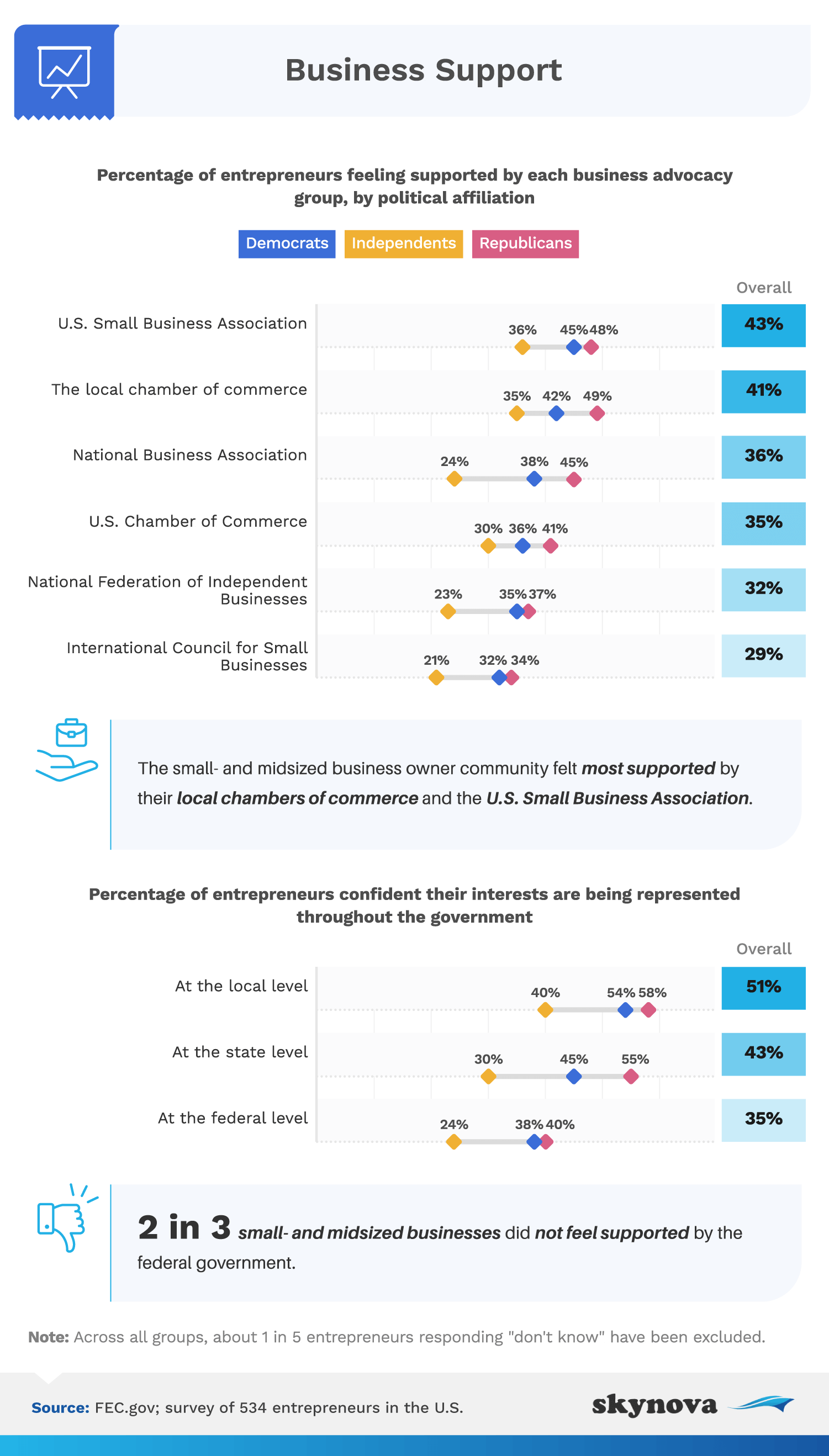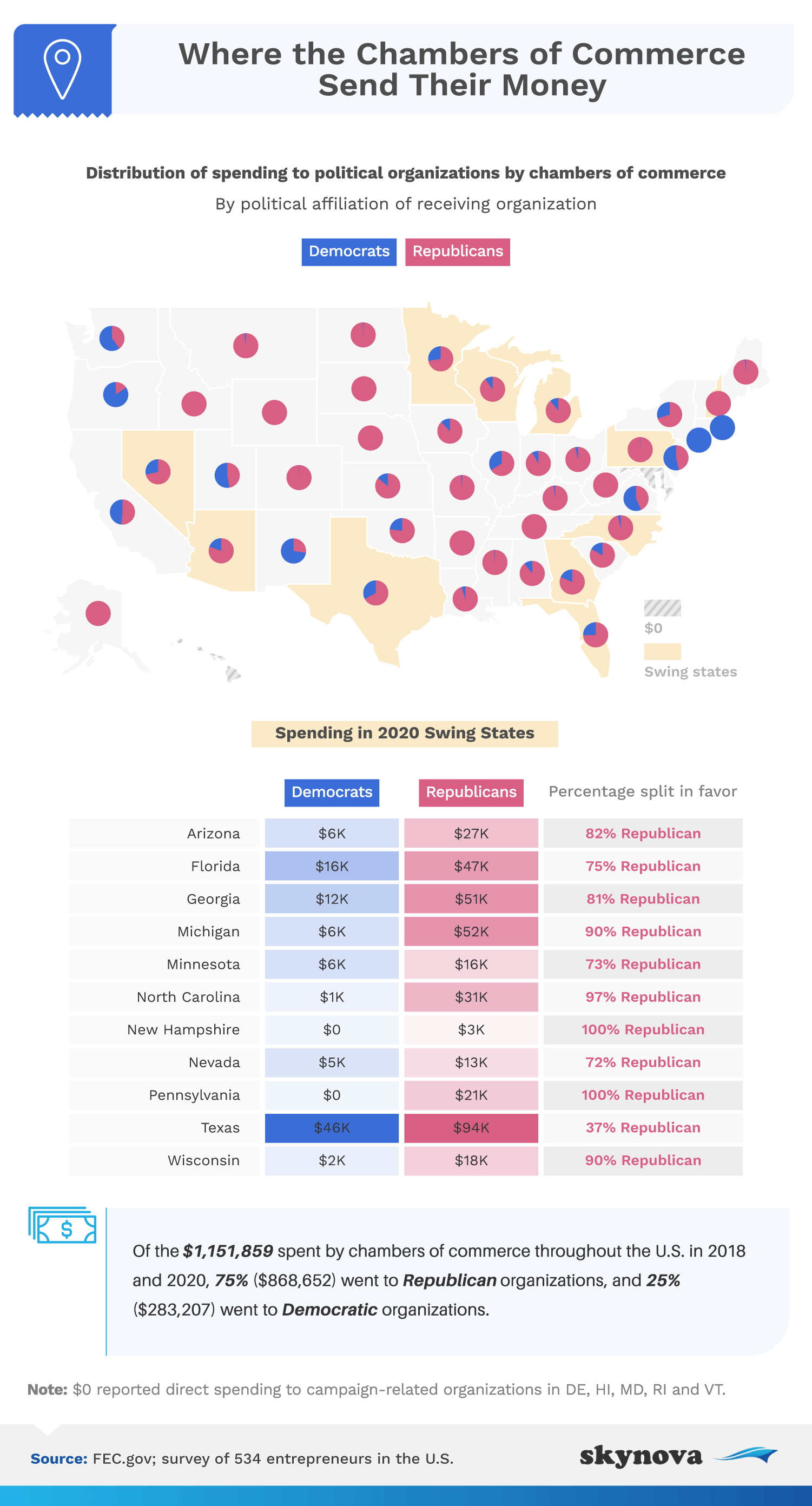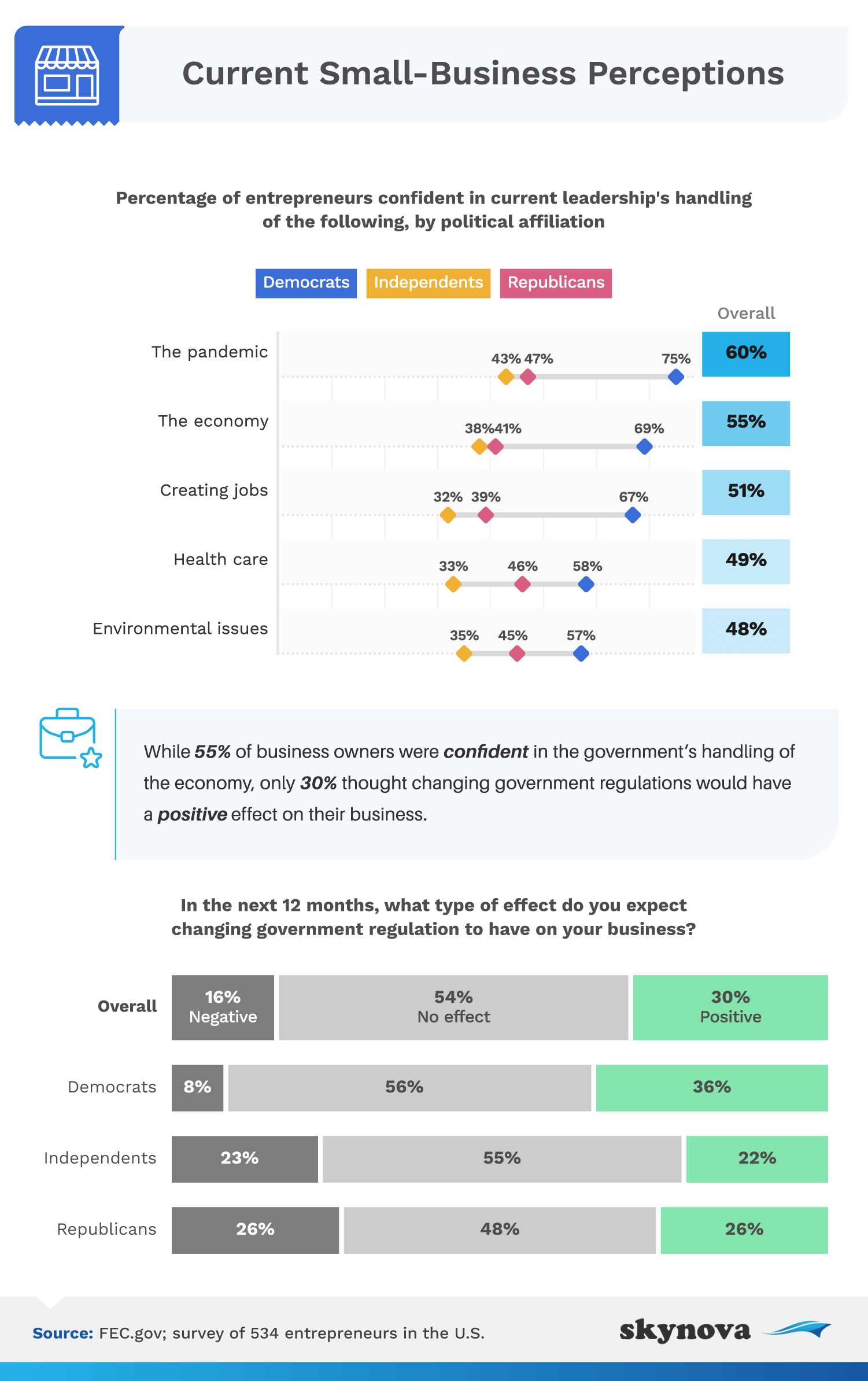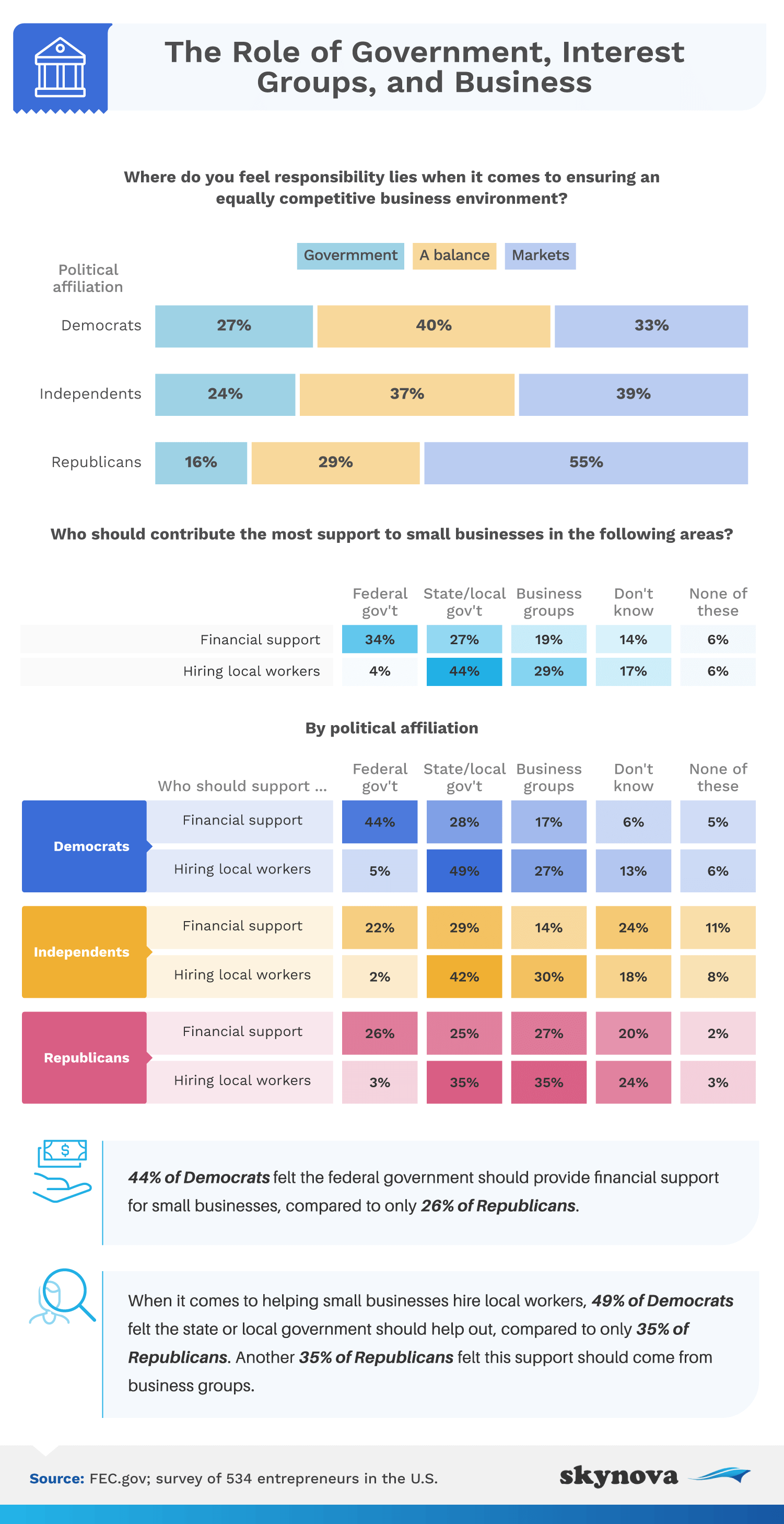
|
Entrepreneurs are always looking for ways to stay ahead of their competition. Chambers of commerce and other business organizations certainly offer help in this department. However, as our political views become more ingrained in our social identities and business brands, entrepreneurs may want more insight into how people like themselves perceive these organizations and to understand how well these organizations’ politics align with their own. We surveyed 534 entrepreneurs to get a better picture of how they feel about various pro-business organizations and their politics. Keep reading to learn more about what other entrepreneurs think of these organizations, then decide for yourself.
When it comes to types of business advocacy groups, entrepreneurs seem to prefer specialized and local organizations over their larger, more generalized counterparts. For example, 43% of the business owner community felt supported by the U.S. Small Business Association, followed by 41% feeling supported by their local chambers of commerce. While these levels of support may seem unimpressive initially, their significance is clearer when compared to perceived support from other business advocacy groups: Only 29% of entrepreneurs felt supported by the International Council for Small Business, and 36% or less felt supported by national groups like the U.S. Chamber of Commerce, the National Federation of Independent Businesses, or the National Business Association.

These sentiments toward national organizations are mirrored in entrepreneurs’ confidence in the various levels of government. Two-thirds of entrepreneurs lacked confidence in the federal government to represent their interests, while slightly more than half believed in the local government’s ability to keep entrepreneurs’ best interest at heart.
As one might expect, political party affiliations (Democrat, Republican, Independent) impact entrepreneurs’ support for and confidence in the business advocacy groups and levels of government we explored. The U.S. Chamber of Commerce has traditionally been viewed as an arm of the GOP and has a history of backing "pro-business" candidates, who tend to be Republicans. Therefore, it’s no great surprise that Republican entrepreneurs are most likely to feel supported by the government and business advocacy organizations. However, both Democrat and Republican entrepreneurs have reservations about the federal government representing their interests, which tells an interesting story. Democrats have recently begun encouraging businesses to use their influence and resources to further the Democratic policy agenda. Meanwhile, tensions between the Republican Party and big business have been growing in the last year and may be beginning to trickle down to smaller businesses, too, affecting Republican entrepreneurs’ faith in federal government programs. Perhaps this bipartisan alignment of entrepreneurs on the federal government is a snapshot of two ships passing in the night – Democrats on their way toward greater confidence in the federal government, while Republicans grow increasingly less confident.
We decided to further examine the chambers of commerce given their popularity among entrepreneurs and their prevalence throughout the business community. The U.S. Chamber of Commerce is a massive business network that seeks to further the interests of companies – both big and small – across the economy. Regardless of their size, companies who are members of a chamber of commerce are united in the organization’s mission to lobby for pro-business policies aimed at creating jobs and growing the economy. Every state as well as the five major U.S. territories has at least one chamber of commerce chapter. Membership dues for most local chapters start below $50 per month, but that cost can increase depending on the level of membership one chooses. Advanced membership levels offer more benefits but also come with a higher price tag. However, these dues can typically be deducted as a business expense, so businesses calculating the return on investment for membership in a chamber of commerce chapter should take that into consideration. There is more to the U.S. Chamber of Commerce than just monthly dues, though.

As a business owner, you may also want to consider how well the chamber of commerce aligns with and supports your values, particularly when politics are involved. Of the $1,151,859 spent by chambers of commerce throughout the U.S. in 2018 and 2020, 75% ($868,652) went to Republican organizations, and 25% ($283,207) went to Democratic organizations. Most of the funds going to Democratic organizations were in states that already leaned blue politically (e.g., Oregon, Connecticut, Massachusetts). Certain swing states like Florida, Texas, Nevada, and Minnesota tended to have about a quarter of Chamber spending going toward Democratic organizations, which could imply the national chambers of commerce were hedging their bets to be in good standing with whichever political party next came into power or that they were avoiding taking a political stance by siding completely with one party or the other in these important swing states. Overall, though, the chambers’ spending in 2020 swing states was overwhelmingly in favor of Republicans, which makes the latter argument about the chamber trying to be apolitical in their spending habits unlikely.
Next, we looked at entrepreneurs’ confidence in how leaders handled various issues, including the pandemic, the economy, creating jobs, health care, and environmental issues. Our sample consisted of 534 entrepreneurs – 22% were Republicans, 27% were Independents, and 51% were Democrats. Small-business owners on a national scale still lean slightly more Republican; however, last year, the National Small Business Association reported that 17% of now-Democratic small-business owners changed political parties in the last five years, compared to just 9% of now-Republicans who’d made similar party changes. This shift in party affiliations may mean that our sample is more representative of changing political trends among entrepreneurs than one might initially think.

Across the board, Democratic entrepreneurs had the most confidence in current leadership to handle the issues we explored. In contrast, Independents had the least confidence in current leadership. The handling of the pandemic had the greatest split between Democratic and Republican entrepreneurs, with 75% of Democrats having confidence in current leadership, compared to only 47% of Republicans reporting confidence. Given the direct impact the pandemic had on small businesses, as well as the politicized nature of lockdown orders during an election year, it’s no great surprise that confidence in leadership’s handling of this issue was polarized between Democratic and Republican entrepreneurs.
Interestingly, while 55% of business owners were confident in the government’s handling of the economy, only 30% thought changing government regulations would have a positive effect on their business. Democrats were the most likely cohort to think changing regulations would have a positive effect on their business, which may be associated with having a Democratic president. Republican entrepreneurs were three times more likely than their Democratic counterparts to think that changing government regulations would have a negative impact on their business. Still, the majority of entrepreneurs across the political spectrum thought changing government regulations would have no effect on them, which may be indicative of the previously mentioned disconnect small-business owners feel between themselves and the federal government.
When it comes to who should be supporting small businesses, opinions vary in interesting ways. For example, 44% of Democratic entrepreneurs believed the federal government should provide financial aid to small businesses, compared to only 26% of Republican entrepreneurs. However, 20% of Republican entrepreneurs simply said they don’t know who should financially support small businesses, which leads us to believe they may not have a particularly strong opinion on the matter. In terms of responsibility for ensuring an equally competitive business environment, Republican and Independent entrepreneurs agreed that the markets should decide, not the government. While Democrats were in agreement that the responsibility of ensuring an equitable business environment doesn’t lie solely with the government, they didn’t think it should fall squarely on the market’s shoulders either; instead, Democrats preferred a balance between markets and government.

When it comes to helping small businesses hire local workers, 44% of Democrats felt the state or local government should help out, compared to only 35% of Republicans who believed the same. Another 35% of Republicans felt this support should come from business groups. However, across the political spectrum, all entrepreneurs agreed that the federal government isn’t the best entity for helping businesses hire local workers, which reiterates earlier points that small businesses prefer to keep most business-related issues local.
While the Federal government certainly has its place in the business world, most entrepreneurs feel a disconnect between their daily operations and federal support. Instead, business owners seemed to agree that interest groups focusing on local issues – like the chambers of commerce and U.S. Small Business Association – are better equipped to support small-business owners than are their national and international counterparts. Similarly, although views on the exact roles and responsibilities each level of government should hold varied depending on one’s political views, entrepreneurs all seemed united in the belief that local and state governments better understand their needs.
In that last year – especially with the global pandemic – we’ve seen a change in the political landscape as well as how small businesses operate. Given these changes and the uncertainty we’ve all felt over the last year, we anticipate small and midsized business owners across the political spectrum will continue to prioritize the local communities, focused interest groups, and smaller levels of government that supported them throughout an unprecedented year.
Regardless of your politics, the business world has enough obstacles to navigate on its own; when you add in additional layers, like government support and pro-business interest groups, it may start to feel like too much. That’s where Skynova comes in. Our innovative invoicing service simplifies your business operations so that you can spend more time defining the values that are key for your business and deciding which interest groups best support those values, regardless of your politics.
We collected data on spending by state-level chambers of commerce and the U.S. Chamber of Commerce using the Federal Election Commission lookup tool (www.fec.gov). We collected 534 responses of entrepreneurial Americans from Prolific. 52% of our participants identified as men, 47% identified as women, and roughly 1% identified as nonbinary or nonconforming. Participants ranged in age from 18 to 79 with a mean of 40 and a standard deviation of 12.4. Those who failed an attention-check question were disqualified.
The data we are presenting rely on self-report. There are many issues with self-reported data. These issues include, but are not limited to, the following: selective memory, telescoping, attribution, and exaggeration.
Do you have strong feelings about the role of government organizations in the economy? We encourage you to share the results of this study for further discussion for any noncommercial use with the inclusion of a link back to this page in your story so readers have full access to our methodology and findings.